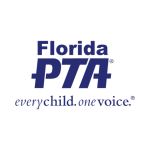Session 1 - Physical and Human Geography
Principal speaker: Dr. Kwesi DeGraft-Hanson
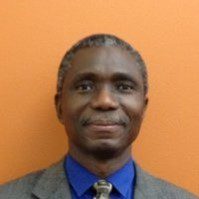 A native of Ghana who spent part of his childhood in Great Britain and who has made the United States his home for many decades, Dr. Kwesi DeGraft-Hanson has personally and professionally traced the history of the Triangular Trade by uncovering and bringing to public notice its geographical manifestations. He holds a B.A. in Geography from the University of Ghana, an MLA in Landscape Architecture from the University of Georgia, and a Ph.D. in Interdisciplinary Studies from Emory University. For nearly two decades he has served as the Principal Landscape Architect for Eden Garden Design Associates in Buford and Atlanta, Georgia.
A native of Ghana who spent part of his childhood in Great Britain and who has made the United States his home for many decades, Dr. Kwesi DeGraft-Hanson has personally and professionally traced the history of the Triangular Trade by uncovering and bringing to public notice its geographical manifestations. He holds a B.A. in Geography from the University of Ghana, an MLA in Landscape Architecture from the University of Georgia, and a Ph.D. in Interdisciplinary Studies from Emory University. For nearly two decades he has served as the Principal Landscape Architect for Eden Garden Design Associates in Buford and Atlanta, Georgia.Dr. DeGraft-Hanson’s research explores intersections of African American history, culture, and literature in colonial and antebellum slavery in the American South. His focus is on what he terms “Hidden Landscapes of Slavery,”—places and spaces, like some former plantations and slave auction sites in the American South, that are unmarked and without commemoration. He researches historical and contemporary maps and texts for spatial, architectural and cultural information to facilitate remapping and re-imaging said landscapes, to recreate these as virtual sites that allow commemorative attention towards the former enslaved persons who inhabited these places.
Dr. Degraft-Hanson has won particular recognition for bringing to light long-forgotten details of the “Weeping Time,” the largest slave sale in recorded American history, which took place in Savannah on March 2-3, 1859. Equally notable has been his research on the Butler Island Plantation in Georgia and McLeod Plantation in South Carolina. From architectural materials and techniques to the very names in neglected cemeteries, he has devoted his life to reading landscapes to map the history of enslaved Africans and their descendants.
Dr. Nicholaus Nelson-Goedert
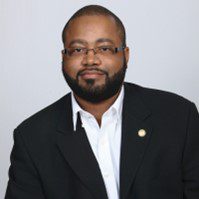 The recipient of a doctorate in sociology from Emory University, Dr. Nicholaus Nelson-Goedert currently serves on the faculty of Miami-Dade College. His commitment to social justice extends far beyond the classroom: as a former NAACP NextGen Fellow, he has consistently sought to empower youth voices. During his tenure on National PTA’s Board of Directors (2008-2011), he chaired the Youth Involvement Committee. Dr. Nelson-Goedert currently sits as Chair of Florida PTA’s Diversity, Equity, Inclusion, and Justice (DEIJ) Committee, dedicating himself to fulfilling the PTA mission: “To make every child’s potential a reality by engaging and empowering families and communities to advocate for all children.”
The recipient of a doctorate in sociology from Emory University, Dr. Nicholaus Nelson-Goedert currently serves on the faculty of Miami-Dade College. His commitment to social justice extends far beyond the classroom: as a former NAACP NextGen Fellow, he has consistently sought to empower youth voices. During his tenure on National PTA’s Board of Directors (2008-2011), he chaired the Youth Involvement Committee. Dr. Nelson-Goedert currently sits as Chair of Florida PTA’s Diversity, Equity, Inclusion, and Justice (DEIJ) Committee, dedicating himself to fulfilling the PTA mission: “To make every child’s potential a reality by engaging and empowering families and communities to advocate for all children.”Dr. Kiran Jayaram
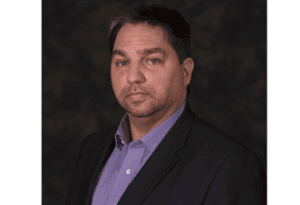 Dr. Kiran Jayaram, Assistant Professor of Anthropology at the University of South Florida, describes his life as a study in crossing borders. The child of rural migrants, he was born in Kansas City, Missouri, but grew up across the state line in Kansas. There he combined his love for heritage dishes like rice and yogurt with an equal passion for mid-America pastimes like riding go-carts. His education is similarly hybrid: private and public elementary schools, Jesuit and public high schools, Ivy League and public universities.
Dr. Kiran Jayaram, Assistant Professor of Anthropology at the University of South Florida, describes his life as a study in crossing borders. The child of rural migrants, he was born in Kansas City, Missouri, but grew up across the state line in Kansas. There he combined his love for heritage dishes like rice and yogurt with an equal passion for mid-America pastimes like riding go-carts. His education is similarly hybrid: private and public elementary schools, Jesuit and public high schools, Ivy League and public universities.Dr. Jayaram’s research, focusing on the anthropology of education, political economy and migration/mobility, likewise explores linguistic, cultural and economic boundaries. Co-founder in 2010 of Transnational Hispaniola, he has extensive knowledge of this island shared by two nations: the Republic of Haiti and the Dominican Republic. Since 2019, he has been working on the project of “Island Anthropologies” that considers the past, present, and future of anthropologies on Hispaniola.
Session 2 - African American Achievements

Principal Speaker: Dr. David Canton
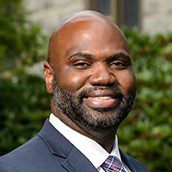 A native son of the Bronx, Dr. David Canton long ago climbed into a metaphorical “drop-top Chevy with the roof wide open” [T.I.] and embarked on a life journey whose most recent milestone has been his selection, after a nationwide search, as Director of the African American Studies Program at the University of Florida. As he told Camille Hagins during a WUFT interview, when he entered Morehouse College as a first-generation college student, he thought professors were “old guys with thick glasses.” Now, decades later, after a B.A. in history from Morehouse, an M.A. in Black Studies from Ohio State, a doctorate in history from Temple, and a distinguished tenure as a professor and administrator at Connecticut College, he teaches courses on hip hop and other hot topics while embracing the considerable administrative challenge of turning UF’s 50-year-old African American Studies program into a vibrant catalyst of democratic change. “Whether it’s during Reconstruction or during the Civil Right Movement, Black folks have been at the center of making America a democracy,” he told Ms. Hagins.
A native son of the Bronx, Dr. David Canton long ago climbed into a metaphorical “drop-top Chevy with the roof wide open” [T.I.] and embarked on a life journey whose most recent milestone has been his selection, after a nationwide search, as Director of the African American Studies Program at the University of Florida. As he told Camille Hagins during a WUFT interview, when he entered Morehouse College as a first-generation college student, he thought professors were “old guys with thick glasses.” Now, decades later, after a B.A. in history from Morehouse, an M.A. in Black Studies from Ohio State, a doctorate in history from Temple, and a distinguished tenure as a professor and administrator at Connecticut College, he teaches courses on hip hop and other hot topics while embracing the considerable administrative challenge of turning UF’s 50-year-old African American Studies program into a vibrant catalyst of democratic change. “Whether it’s during Reconstruction or during the Civil Right Movement, Black folks have been at the center of making America a democracy,” he told Ms. Hagins.In discussing today’s topic, African and African American achievements, Dr. Canton will be going far beyond the traditional framework of facts and firsts. He will be stressing the importance of interpretation, and our own role in shaping and broadcasting a narrative that is not static, but continuous, that does not set boundaries between the academic and the experiential, and that allows us, as living participants, to take the top down and cruise, speakers blasting at will.
Panelist: Ms. Renee O’Connor
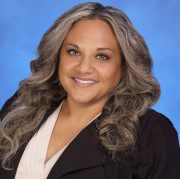 Renee O’Connor stands at the crux of African American history–and of K-12 African American history instruction–as they play out in Florida. Born in Kingston, Jamaica – her family moved to Miami when she was 6 – she grew up in Miami Gardens, then enrolled as a 1st generation college student at Florida State, where she earned a Bachelors in International Affairs with a minor in Black Studies. She began her career in Corporate America, but left Ritz-Carlton Hotels International in 2006 to start a dance company, which she ran for 5 years. It was a speech by President Obama in the fall of 2010 describing the state of public education in America that sparked her interest and inspired a career change.
Renee O’Connor stands at the crux of African American history–and of K-12 African American history instruction–as they play out in Florida. Born in Kingston, Jamaica – her family moved to Miami when she was 6 – she grew up in Miami Gardens, then enrolled as a 1st generation college student at Florida State, where she earned a Bachelors in International Affairs with a minor in Black Studies. She began her career in Corporate America, but left Ritz-Carlton Hotels International in 2006 to start a dance company, which she ran for 5 years. It was a speech by President Obama in the fall of 2010 describing the state of public education in America that sparked her interest and inspired a career change.
Dismayed by the dismal statistics pertaining to Black and Brown kids in public school, she applied and was accepted to the Teach For America program and was placed at Miami Norland Senior High in the fall of 2011. This was a homecoming: a self-described “Norland girl,” she had attended Norland Elementary and Norland Middle, and was a Miami Norland graduate.
After 3 years of teaching reading and English, she was finally blessed with the opportunity to teach her true passion, African American History. Her goal was simple, to show her students WHY history matters, WHY they matter, and WHY education is the way for them to actualize their dreams. Her work inspired students, earned the respect of her colleagues, and gained recognition: she was one of the 4 finalists out of 18,000 teachers in Miami Dade for the Miami Dade Teacher of the Year 2022-2023.
Currently Ms. O’Connor is on sabbatical obtaining her Masters in Instructional Systems and Learning Technology from Florida State University, with plans to graduate in the Summer of 2024. Her work has continued far beyond the classroom walls, however. Last October, she traveled with the Community Justice Project to Geneva, Switzerland to testify in front of the International Covenant on Civil and Political Rights at the United Nations during its review of the United States Human Rights contract.
Ms. O’Connor continues to speak up and advocate that teachers have the ability to teach the truth, no matter how uncomfortable that truth may be. Today, she will be inviting us to consider the achievements of Africans, African Americans, and their cultures, and to visualize the ways in which our own narrative represents an achievement.
Session 3 - African Americans in Florida

Additional Resources
Colby Williams Presentation
Florida State Academic Standards – Social Studies
Principal speaker: Paul Ortiz, PhD.
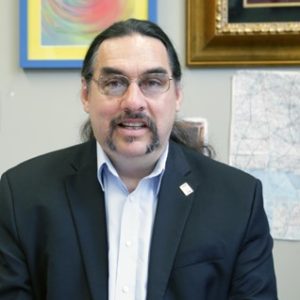 In the words of Jon Sensbach, Chair of the Department of History at the University of Florida “Paul Ortiz is a historian who is not content to simply tell us what we already know. He is a historian who challenges us to think differently about the past, and to consider the ways in which our understanding of history shapes our present and future.” Professor Ortiz, who earned his doctorate in history at Duke, has distinguished himself on numerous fronts. He is a third-generation military veteran, serving as a paratrooper in the 82nd Airborne Division and the 7th Special Forces Group in Central America, where he received the US Armed Forces Humanitarian Services Medal. He is the author of numerous ground-breaking publications focusing on the experiences of people of color, including the Black Freedom struggle in Florida. His book awards include the Lillian Smith Book Prize, the Harry T. and Harriett V. Moore Book Prize, and a PEN Oakland Josephine Miles Literary Award. Professor Ortiz has served as the Director of the Samuel Proctor Oral History Program, an initiative to engage students in the research and recounting of oral history, including that of descendants of the Underground Railway. Last, but certainly not least, he is a gifted teacher, who has been honored as Teacher of the Year at the University of Florida, and who assisted the National Endowment for the Humanities in developing a web interface and curriculum modules for K-12 educators.
In the words of Jon Sensbach, Chair of the Department of History at the University of Florida “Paul Ortiz is a historian who is not content to simply tell us what we already know. He is a historian who challenges us to think differently about the past, and to consider the ways in which our understanding of history shapes our present and future.” Professor Ortiz, who earned his doctorate in history at Duke, has distinguished himself on numerous fronts. He is a third-generation military veteran, serving as a paratrooper in the 82nd Airborne Division and the 7th Special Forces Group in Central America, where he received the US Armed Forces Humanitarian Services Medal. He is the author of numerous ground-breaking publications focusing on the experiences of people of color, including the Black Freedom struggle in Florida. His book awards include the Lillian Smith Book Prize, the Harry T. and Harriett V. Moore Book Prize, and a PEN Oakland Josephine Miles Literary Award. Professor Ortiz has served as the Director of the Samuel Proctor Oral History Program, an initiative to engage students in the research and recounting of oral history, including that of descendants of the Underground Railway. Last, but certainly not least, he is a gifted teacher, who has been honored as Teacher of the Year at the University of Florida, and who assisted the National Endowment for the Humanities in developing a web interface and curriculum modules for K-12 educators.Professor Ortiz is currently on sabbatical from UF prior to joining Cornell University this fall as a Professor of Labor History. Before he stocks up on parkas and gloves in preparation for winters in Ithaca, he has graciously agreed to share his insights with us on the topic of African Americans in Florida.
Panelist: Roberto Fernandez III
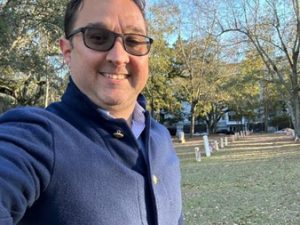 Roberto Fernandez III wears many hats: a former Civil Affairs Specialist with the US Army, he is a history teacher with twenty years of experience who has been recognized as a Florida Social Studies Teacher of the Year. At the same time, he serves as Historian-in-Residence at History Fort Lauderdale, and as an adjunct lecturer in history at Florida International University.
Roberto Fernandez III wears many hats: a former Civil Affairs Specialist with the US Army, he is a history teacher with twenty years of experience who has been recognized as a Florida Social Studies Teacher of the Year. At the same time, he serves as Historian-in-Residence at History Fort Lauderdale, and as an adjunct lecturer in history at Florida International University.As a specialist in the field, Mr. Fernandez was one of those selected to serve on the African American history workgroup responsible for recommending new K-12 standards in African American history. In the firestorm of criticism that followed the release of these standards, he was unique among his colleagues to call, in an open letter to Commissioner of Education Manny Diaz, Jr., first, for the reconvening of the workgroup in order to respond to community feedback, and secondly, in a spirit of transparency, for the publication of all workgroup meeting recordings, minutes, and ancillary materials. In his letter, he proclaimed, “As educational leaders, we must demonstrate through our words and actions that Floridians do not hide from history, but instead we embrace its lessons and teach them truthfully to the next generation.” We look forward to the lessons he will be providing today.
Panelist: Colby Williams
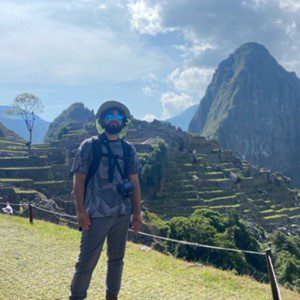 Colby Williams is a master’s student at the University of South Florida on the archaeology track, with a concentration in cultural resource management (CRM). He has over seven years of CRM experience and is familiar with all phases of archaeological excavation. As an undergraduate, he attended an NSF-sponsored field school dedicated to the study of the human impact on the environment in the Anthropocene Epoch. Last year, he was selected as the inaugural awardee for USF’s Susan K. Ryan Fellowship in support of his thesis research on the maroon community at Prospect Bluff. Today, he will be sharing with us insights about this community that is often left out of the dominant narrative but remains crucial to understanding early nineteenth-century Florida history
Colby Williams is a master’s student at the University of South Florida on the archaeology track, with a concentration in cultural resource management (CRM). He has over seven years of CRM experience and is familiar with all phases of archaeological excavation. As an undergraduate, he attended an NSF-sponsored field school dedicated to the study of the human impact on the environment in the Anthropocene Epoch. Last year, he was selected as the inaugural awardee for USF’s Susan K. Ryan Fellowship in support of his thesis research on the maroon community at Prospect Bluff. Today, he will be sharing with us insights about this community that is often left out of the dominant narrative but remains crucial to understanding early nineteenth-century Florida history
